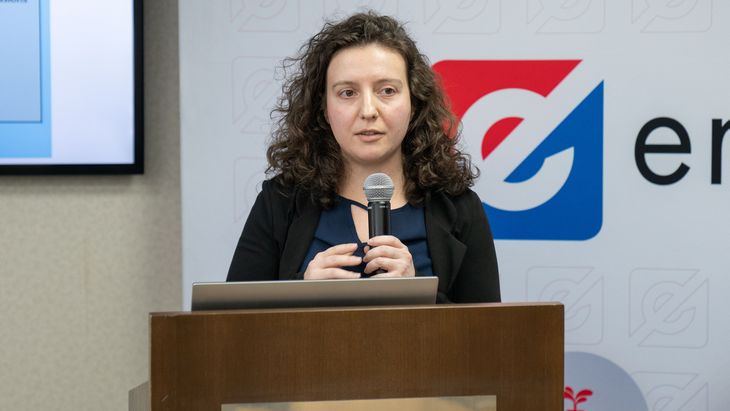Exiting natural gas is only feasible by 2050 but accelerating natural gas phase-out is the most efficient way to reduce Southeast Europe’s exposure to security of import risks, said Kostantsa Rangelova, Senior Energy and Climate Analyst at the Center for the Study of Democracy (CSD Bulgaria). Romania could become, after 2030, a net exporter of natural gas and by this the country will completely eliminate the risk associated with the imports of natural gas, she said, at the conference “Regional Approach Sofia”, organized by Energynomics.
”The greatest reduction of risk comes from the policies and measures that reduce as much as possible but not fully the natural gas demand by 2030. In the case of Bulgaria and Greece, there is a 50 reduction of risk compared to 2021, while for Romania there is a 100 reduction of the import security risk which actually reflects the fact that in this scenario Romania becomes a net exporter of natural gas”, said Kostantsa Rangelova.
From 2014 up until 2021 Bulgaria, Romania, and Greece recorded a significant increase of natural gas imports and the dependency of Russian gas led to a huge increase of this risk. But, by 2030, these risks are expected to be reduced significantly.
CSD Bulgaria is trying to look at the future and how it might look in terms of security risks for Bulgaria, Romania, and Greece. To get a clear picture, CSD uses several external scenarios to assess the level of risk, including the EU’s Fit for 55 scenario.
In 2021, Romania recorded a score of 97.9 in terms of risk associated with gas imports from Russia, while Bulgaria had a score of 215.3 and Greece scored 257.7. By 2030, Romania could marginally improve this score to 95.2 but in the Fit for 55 scenario, the risk of gas imports should go down to zero.
”We see that in Romania the accelerated gas phase-out scenario is the scenario where Romania actually becomes a net exporter of natural gas and of course, this is assuming a very conservative outlook in terms of natural gas production in Romania so if we have more ambitious gas production trajectory, we might even see higher exports out of Romania contributing to the security of both Bulgaria and Greece”, Rangelova added.
Other steps that the three countries must take to eliminate the risks regarding gas imports are targeted policies supporting energy efficiency and the roll-out of heat pumps in buildings. Also, industrial applications are necessary to accelerate the decline of natural gas demand.
DOWNLOAD THE PRESENTATION OF KOSTANTSA RANGELOVA
In exchange, the three countries should support a faster uptake of renewables to lower energy costs and to reduce energy and climate security risks. Encouraging citizens to become prosumers „is a key solution to the energy poverty challenges”.
„The energy-poor consumers are the ones that suffer the most from this transition and we need them to be not just on board but they need to be part of this transition and protected by price risks”, Rangelova concluded.
The conference “Regional Approach Sofia” was organized by Energynomics with the support of our partners: Eaton Electric, Finder, Kawasaki Gas Turbine Europe.
